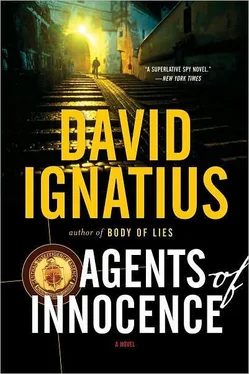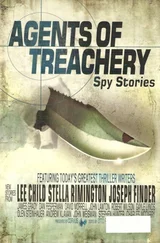David Ignatius - Agents of Innocence
Здесь есть возможность читать онлайн «David Ignatius - Agents of Innocence» весь текст электронной книги совершенно бесплатно (целиком полную версию без сокращений). В некоторых случаях можно слушать аудио, скачать через торрент в формате fb2 и присутствует краткое содержание. Жанр: Шпионский детектив, на английском языке. Описание произведения, (предисловие) а так же отзывы посетителей доступны на портале библиотеки ЛибКат.
- Название:Agents of Innocence
- Автор:
- Жанр:
- Год:неизвестен
- ISBN:нет данных
- Рейтинг книги:3 / 5. Голосов: 1
-
Избранное:Добавить в избранное
- Отзывы:
-
Ваша оценка:
- 60
- 1
- 2
- 3
- 4
- 5
Agents of Innocence: краткое содержание, описание и аннотация
Предлагаем к чтению аннотацию, описание, краткое содержание или предисловие (зависит от того, что написал сам автор книги «Agents of Innocence»). Если вы не нашли необходимую информацию о книге — напишите в комментариях, мы постараемся отыскать её.
Agents of Innocence — читать онлайн бесплатно полную книгу (весь текст) целиком
Ниже представлен текст книги, разбитый по страницам. Система сохранения места последней прочитанной страницы, позволяет с удобством читать онлайн бесплатно книгу «Agents of Innocence», без необходимости каждый раз заново искать на чём Вы остановились. Поставьте закладку, и сможете в любой момент перейти на страницу, на которой закончили чтение.
Интервал:
Закладка:
“We photographed them together a week ago. Then we began to look around. It seems that Kizib maintains regular contact with several members of army intelligence. They know exactly what he’s up to with the Lebanese Christians and, in fact, they seem to have given him their blessing. That’s how he gets some of his explosives.”
“Now let me get this straight,” said Hoffman. “We’ve got a Palestinian who’s training a bunch of Lebanese Christians to kill other Palestinians, with the blessing of the Lebanese Army.”
“More or less,” said Rogers. “But the best is yet to come.”
Rogers handed another black-and-white photo to Hoffman. This one showed the Bombmaker walking down a narrow street, framed by rough cinderblock buildings.
“This was taken in Tal Zaatar refugee camp,” said Rogers. “Our man is paying a secret visit to another set of his friends. Guess who they are?”
“In Tal Zaatar, they must be Palestinians,” said Hoffman.
“Correct,” answered Rogers. “He’s visiting one of the men who handles logistics for Fatah. We think he went there on behalf of his friends in East Beirut to buy rocket-propelled grenades-RPGs-for one of the Christian militias. This was just four days ago, so we’re still checking out some of the details. But as near as we can reconstruct the deal, the Fatah man agreed to sell Kizib one hundred RPGs, at eight hundred Lebanese pounds each. All out of Fatah’s stores of ammunition.”
“You’re shitting me,” said Hoffman. “A Palestinian from Fatah is selling grenades to the Christians to use in killing Palestinians!”
“You got it,” said Rogers.
“Humor me,” said Hoffman. “Explain to me why the Bombmaker is doing these odious things.”
“For money,” said Rogers. “And fun.”
There was silence.
Rogers had a mental picture of the arsenals that were being assembled in basements and warehouses across town. Homemade cluster bombs for residential neighborhoods; RPGs to shoot across the boundaries of East and West Beirut; car bombs for mosques and churches; sniper’s rifles to attack innocent civilians who happened to be the wrong religion; pistols with silencers to remove obstinate politicians; and the militias training in secret while the scoundrels who ran the country tried to squeeze the last piastre of graft from the dying system. And in the middle of it all, at the eye of the hurricane that was destroying Lebanon, stood a small group of professionals like the Bombmaker, who saluted all flags but sailed under none, who disdained ideology and sold their services to whoever was willing to pay the price.
“The question,” said Rogers, “is what we do about it.”
“That is indeed the question,” said Hoffman. “And I fortuitously have the answer.”
“Which is?”
“That we do nothing about it.”
Rogers looked at him, dumbfounded.
“You can’t mean that,” said Rogers.
“Wanna bet?”
“But for God’s sake, Frank,” said Rogers, his usually calm voice becoming insistent. “We should do something before things get out of control.”
“Like what?”
“Simple things. A media program to bolster moderate political opinion. Security assistance for what’s left of the Deuxieme Bureau. Contacts between Palestinian and Christian leaders. Recruit more people who can keep tabs on the gangs of thugs out there. Anything. But we should do something.”
“My boy,” said Hoffman. “Forgive me for saying this, but that’s a very American response. You see a problem on the horizon. Ergo, you want to solve it. I understand completely. I share your concerns. But forget it! Uncle Sam isn’t going to solve the problems of this fucked-up little country! So let’s not waste our time trying.”
“But this is serious!” said Rogers. “A friendly country is falling apart. Surely there is something we can do?”
“Yes, as a matter of fact there is,” said Hoffman. “We can stay the fuck out of the way! We can do our best to see that when this little papier-mache democracy falls apart, as few Americans as possible get hurt.”
Rogers looked away glumly.
“We aren’t the Salvation Army,” Hoffman continued. “Some of our colleagues tend to forget that sometimes. Like a few years ago, when people got sentimental ideas about saving democracy in another little turd of a country. Remember where?”
Rogers didn’t answer.
“I’ll give you a hint,” said Hoffman. “The capital is Saigon.”
“What about the Bombmaker?” asked Rogers quietly. “Isn’t there something we can do about him?”
“You tell me,” said Hoffman. “What can we do about him?”
There was a long silence. The words were on Rogers’s lips: Kill him. Deprive the demented bastard of his ability to build any more bombs. Just kill him. But he couldn’t say it, and he knew in that moment that Hoffman was right. There was nothing that they could do except stay out of the way.
“Saving the world isn’t our job,” Hoffman said gently to the younger man. “We aren’t priests and we aren’t assassins.”
Rogers thought of a Lebanese proverb he had heard from a Druse friend. It was becoming a kind of Lebanese national prayer, and perhaps it was Rogers’s prayer as well. The proverb said: Kiss the hand you cannot bite, but call upon God to break it.
Rogers was sitting at home one night late that summer, reading a book. There was a knock at the door, then the sound of something heavy dropping to the floor, then the sound of footsteps running away down the stairs and out the door of the apartment building.
Jane was closest to the door. She had risen from her chair to answer the knock but Rogers stopped her and went himself. He looked carefully through the peephole but saw nothing. Curious, he unbolted the door to make sure nobody was there.
“Oh my God,” muttered Rogers.
He closed the door and told Jane to go into the nursery immediately with the children and stay there. He placed a quick call to the security officer at the embassy. Then he went back to the front door.
There on the floor of the landing was the body of Amin Shartouni. The face was horribly distorted, caught in what seemed a final scream of anguish. Dried blood covered his mouth and chin and was crusted on his shirt. There was something on the floor next to the corpse. In the dim light of the hallway, Rogers could barely see it at first. It looked like a piece of meat, rough and red. He bent down and looked at it carefully and then felt a surge of nausea.
It was the boy’s tongue, which had been cut from his mouth and left as a warning.
The war of the bombs began a few months later, when a series of explosions rocked Beirut. The bombers hit a wide range of targets, from a pharmacy owned by the leader of the right-wing Phalange Party, to the offices of a leftist, pro-Iraqi newspaper.
What frightened the Lebanese was that the attacks were so random and anonymous. The Palestinians seemed the most likely perpetrators, since they had an interest in destabilizing Lebanon. But there were other theories. Some blamed the Jordanians, who wanted to force Lebanon to crack down against the fedayeen just as the king had done. Others blamed the Israelis, who also wanted to push the Lebanese to take a tougher stand. But the ominous fact was that nobody knew for sure who had done it and nobody was ever brought to justice. The bombings created a feeling of instability throughout Lebanon, a sense that something frightening was happening in the shadows.
30
Damascus; June 1971
Yakov Levi’s last run was to Syria. They told him to service four dead drops: one in Aleppo, one in a remote village south of Homs, two in Damascus. It was the assignment that members of the Mossad station in Beirut dreaded most. Levi had been hoping-praying-that his tour in Beirut would end before he had to do it again. But he was unlucky.
Читать дальшеИнтервал:
Закладка:
Похожие книги на «Agents of Innocence»
Представляем Вашему вниманию похожие книги на «Agents of Innocence» списком для выбора. Мы отобрали схожую по названию и смыслу литературу в надежде предоставить читателям больше вариантов отыскать новые, интересные, ещё непрочитанные произведения.
Обсуждение, отзывы о книге «Agents of Innocence» и просто собственные мнения читателей. Оставьте ваши комментарии, напишите, что Вы думаете о произведении, его смысле или главных героях. Укажите что конкретно понравилось, а что нет, и почему Вы так считаете.












